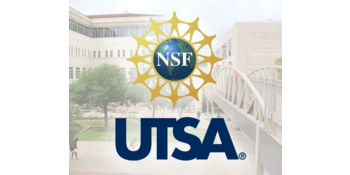Posted on May 9, 2023 by Andrew Chapman

The National Science Foundation (NSF) has awarded 11 UTSA students and alumni prestigious Graduate Research Fellowships to advance their graduate research education. Of the 11, seven are current or former UTSA Honors College students.
The NSF Graduate Research Fellowship Program (GRFP) recognizes and supports outstanding graduate students in STEM disciplines who are pursuing research-based master’s and doctoral degrees at accredited United States institutions.
UTSA’s award recipients this year are:
- Lacie Allen-Bey ’21, medical anthropology
- Naomi Alyafei ’21, bioengineering (Honors College)
- Amanda Gomez ’21, biomedical engineering (Honors College)
- Miranda Lumbreras ’19, life sciences – cell biology (Honors College)
- Kalei Oliver, archaeology
- Samantha Oviedo, biochemistry (Honors College)
- Tristan Pepper, biomedical engineering (Honors College)
- Justin Sharpe ’21, geoscience – paleoclimate
- Morgan Struthers ’21, biomedical engineering (Honors College)
- Joshua Chaj Ulloa, biomedical engineering (Honors College)
- Juan Vasquez ’20, life sciences – neurosciences
The fellowships provide students with a three-year annual stipend of $37,000 along with a $12,000 cost of education allowance, as well as access to opportunities for professional development. The GRFP has a high rate of doctorate degree completion, with more than 70% of students completing their doctorate within 11 years.
In addition, Bethany Cruz ’20, social psychology, received honorable mention from the NSF.
The fellowship recipients include UTSA alumni who are now enrolled in graduate studies at another institution, UTSA undergraduates who are preparing to start graduate school in the fall and current UTSA graduate students.
To encourage a culture where graduate students and mentors prepare and submit competitive applications for national programs, the UTSA Graduate School launched the Graduate School Fellowship Incentive Program in fall 2020. The program encourages graduate students to submit applications to the National Science Foundation’s Graduate Research Fellowship Program and offers students guidance as they navigate the competitive fellowship process. Allen-Bey, Cruz, Gomez, Oliver, and Sharpe participated in this program.
“I congratulate all the GRFP awardees for this remarkable accomplishment,” said Ambika Mathur, vice provost and dean of the UTSA Graduate School. “These awards bring prestige to UTSA and demonstrate the excellence of the mentoring by our faculty. Just as important is the selfless work of our faculty and staff from across campus who came together to provide their time and knowledge in helping students and their advisors put forward winning applications. UTSA truly is a model of collaborative excellence in advancing student success.”
The NSF Graduate Research Fellowship Program is the oldest fellowship program in the nation that directly supports graduate students in various STEM fields. Since 1952, NSF has awarded over 60,000 Graduate Research Fellowships from among 500,000 applicants. Currently, 42 Fellows have gone on to become Nobel laureates and more than 450 have become members of the prestigious National Academy of Sciences.
Seventy-one NSF Graduate Research Fellowship awardees have attended UTSA.
UTSA is a Tier One research university and a Hispanic Serving Institution that puts students first by cultivating an environment that focuses on their success. As a multicultural, next-generation institution where students from all background can excel, the university serves as a prosperity engine by educating and training graduates who are well-prepared to address the workforce needs of our city and state to excel in a global economy.
The original version of this story was originally published on UTSA Today.

